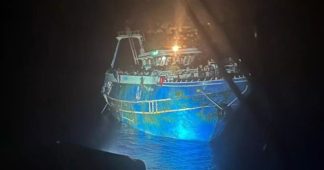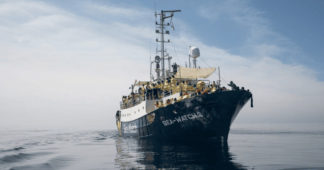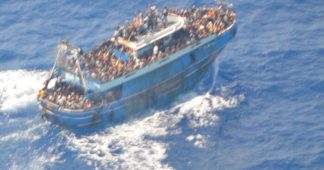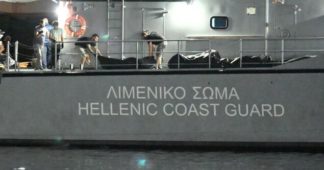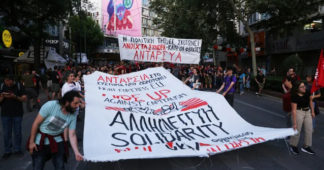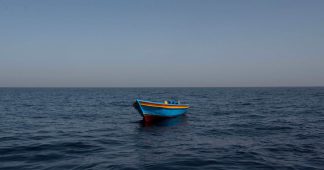Frontex offered to send a plane from Italy to monitor an overcrowded fishing vessel that ultimately sank, but got no response from Athens.
By Nektaria Stamouli
June 23, 2023
riATHENS — The EU Border and Coast Guard Agency says it received no reply from Greece last week after it offered to send a plane to monitor an overcrowded fishing boat that ultimately sank, with a loss of life that is feared to run into the hundreds.
The communication gap is a sign of heightened tension between the EU agency, known as Frontex, and Athens, over the role that each party played in a tragedy that looks liable to go down as the worst shipwreck of the migration crisis in the Mediterranean.
A spokesperson for Frontex told POLITICO that after initially detecting the vessel and notifying the Greek and Italian authorities, it offered to provide additional assistance, including dispatching an aircraft from Italy, but the Greek coast guard never replied.
When asked about this lack of response, the Greek coast guard said it did not want to comment “regarding details of the operational planning.”
The Hellenic Coast Guard is facing increasing questions over its response to the fatal wreck, which happened some 80 kilometers off Pylos in the Peloponnese. Eighty-two bodies have been gathered and 104 people were rescued, but the U.N.’s refugee and migration agencies warn that as many as 400 to 750 migrants were taking the boat on the hazardous crossing from eastern Libya.
Much controversy centers on whether the Greek coast guard acted improperly by acquiescing with people smugglers, who they said had refused assistance and had wanted to be allowed to sail the unstable boat on to Italy. International lawyers have argued that a rescue must not depend on what the smugglers crewing the vessel want.
A Frontex aircraft first spotted the fishing vessel inside Greece’s search and rescue zone in international waters on June 13 and notified the Greek and Italian authorities. The aircraft, deployed by Frontex from Italy, kept monitoring the vessel until it ran out of fuel and had to return to base.
Frontex deployed two aircraft to Greece, a drone and a plane, but neither was involved in this operation. The agency offered to fly the drone over the overcrowded vessel, but the Greek authorities asked it to attend another search and rescue operation south of Crete, where 80 people were in danger, according to a statement issued by the agency.
Frontex then offered to send back the aircraft from Italy, after refueling, but the Greek authorities never replied.
The aircraft allocated to Greece itself by Frontex was neither offered by the agency nor requested by the Greeks. A Frontex press officer said that the aircraft, stationed on the island of Samos in the Aegean, only arrived on June 14, the day that the boat sank.
As a result, “no Frontex plane or boat was present at the time of the tragedy,” as the agency stressed in its statement.
Critics say that the Greek authorities should have acted faster to keep the vessel from capsizing. There are also several testimonies from survivors that the coast guard tied up to the vessel and attempted to pull it, causing the boat to sway, which the Greek authorities strongly deny. The Hellenic Coast Guard said there is no video of the operation available.
Frontex said it had initiated a “serious incident report” (SIR), requiring the agency’s fundamental rights officers to record potential human rights violations.
So far, the European Commission has brushed aside pressure from international organizations to launch an independent probe into the conduct of the Greek authorities, noting that the country’s public prosecutor has started an investigation, but adding that “it is very important to ensure a thorough and transparent investigation.”
Greek Supreme Court Prosecutor Isidoros Dogiakos has urged absolute secrecy in the investigations being conducted in relation to the shipwreck. Nine people smugglers are in detention in Greece, pending trial.
“Think about what’s happening this week,” said former U.S. President Barack Obama at an event organized in Athens on Thursday by Stavros Niarchos Foundation.
“There is a potential tragedy unfolding with a submarine that is getting minute-to-minute coverage all around the world. And it’s understandable because obviously we all want and pray for these folks to be rescued,” Obama said. “But the fact that’s gotten so much more attention than 700 people who sank is an untenable situation.”
We remind our readers that publication of articles on our site does not mean that we agree with what is written. Our policy is to publish anything which we consider of interest, so as to assist our readers in forming their opinions. Sometimes we even publish articles with which we totally disagree, since we believe it is important for our readers to be informed on as wide a spectrum of views as possible.
